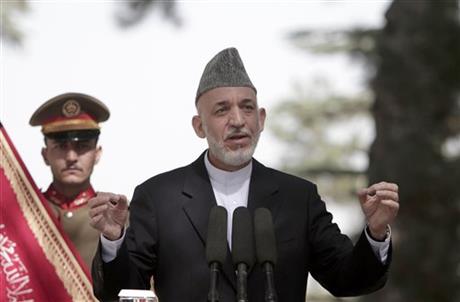
By PATRICK QUINN and RAHIM FAIEZ
Afghan President Hamid Karzai speaks during a press conference at the presidential palace in Kabul, Afghanistan, Monday, Oct. 7, 2013. Karzai says disagreements over security and sovereignty are impeding a security deal with the United States and says he will convene a council of elders in one month to discuss the agreement. (AP Photo/Rahmat Gul)
KABUL, Afghanistan (AP) — Afghanistan’s president on Monday ruled out signing a security deal with the United States until disagreements over sovereignty are resolved, but said he will convene a council of elders in one month to help him make a decision on the pending agreement.
Hamid Karzai made the pointed remarks about the languishing Bilateral Security Agreement even as he condemned what he described as repeated violations of Afghan sovereignty by the United States and allies.
The U.S. wants a deal by the end of October to give American and NATO military planners enough time to prepare for keeping troops in the country after the scheduled 2014 withdrawal — instead of a total pullout similar to the one in Iraq. There are increasing indications the U.S. may in fact pull out all their forces.
“The United States and NATO have not respected our sovereignty. Whenever they find it suitable to them, they have acted against it. This has been a serious point of contention between us and that is why we are taking issue of the BSA strenuously in the negotiations right now,” Karzai said.
Karzai’s comments came on the 12th anniversary of the start of the American campaign in Afghanistan against al-Qaida that ousted its Taliban allies from power. The invasion was in response to the Sept. 11 attacks on the United States, which claimed nearly 3,000 lives.
Karzai’s outburst came in response to a question about a NATO airstrike on Oct. 5 in Nangarhar province, near an airport used by U.S.-led international military coalition forces, that the government claimed killed 5 civilians. The coalition said they struck insurgents trying to mortar the base and that no civilians were hurt. NATO has opened an investigation into the incident.
“They commit their violations against our sovereignty and conduct raids against our people, air raids and other attacks in the name of the fight on terrorism and in the name of the resolutions of the United Nations. This is against our wishes and repeatedly against our wishes,” Karzai said, using some of his harshest language to date against the U.S.-led military coalition.
Karzai has banned coalition airstrikes in populated areas because they sometimes cause civilian casualties.
He said there were various issues to be resolved before he could sign an agreement, which has been in negotiation for nearly a year and is said to be nearly complete. They include American guarantees against foreign intervention, a reference to Pakistan, and a counterterrorism force the U.S. wants to leave in Afghanistan to go after the remnants of al-Qaida.
“Therefore the BSA has become an instrument for us to gain respect for our sovereignty, to gain the protection of the lives of our people. So the BSA is where we will determine this. The United States and its allies, NATO, continue to demand even after signing the BSA they will have the freedom to attack our people, our villages. The Afghan people will never allow it,” he added.
He told reporters that he will convene a Loya Jirga, or council of Afghan elders, in one month to discuss the state of the agreement. Karzai has said the deal needs to be approved by the Loya Jirga, but is doubtful any agreement will have been reached in a month.
Afghanistan and the United States have since last October been negotiating a security deal that will give the U.S. a legal basis for having forces in Afghanistan after 2014, and also allow it to lease bases around the country. If the U.S. does not sign the deal, it is unlikely that NATO or any of its allies will keep troops in Afghanistan. Germany has already indicated it will not commit the 800 soldiers it has promised if the U.S. deal is not signed.
Karzai, however, is pressing demands that the U.S. is reluctant to meet, and apparently thinks that the United States wants the deal more than he does — and will eventually cave in to his demands. It is believed he also wants to shield himself from any possible backlash from signing a deal that some see as compromising too much Afghan sovereignty.
But there appears to be a growing perception gap in the Karzai camp as the United States and many of its allies are now openly considering a full military pullout.
President Barack Obama told the AP last Friday that he would consider keeping some American forces on the ground after the conflict formally ends next year, but acknowledged that doing so would require an agreement. He suggested that if no agreement can be reached, he would be comfortable with a full pullout of U.S. troops.
Karzai had called the news conference to thank candidates for registering to take part in the April 5 presidential elections. A total of 27 presidential candidates, along with two vice-presidential running mates, registered Sunday for the crucial vote next year.
“The participation and nomination for next year’s presidential election showed the national unity of the Afghans and is another step toward prosperity and democracy,” Karzai said.
He also called on government employees not to participate in any pre-electoral shenanigans and called on foreigners not to interfere with the vote.



